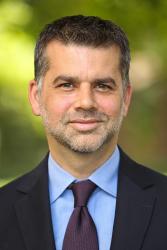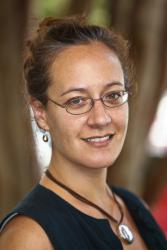Amid a host of challenges, the three major priorities of this year’s United Nations General Assembly will be Russia’s war against Ukraine, climate change, and food shortages. Bruce Jones explains the sideline diplomacy happening in New York, and the rising tension between Western countries’ focus on geopolitics and the global South’s need for progress on climate change.
Related material:
- Rebooting global cooperation is imperative to successfully navigate the multitude of shocks facing the global economy
- Assessing UN state-building in South Sudan, the Democratic Republic of Congo, and beyond
- Local leadership driving progress on the Sustainable Development Goals
- Navigating great power competition – A serious planning start
Listen to Brookings podcasts here, on Apple or Google podcasts or on Spotify, send email feedback to [email protected].
Thanks to audio engineer Gaston Reboredo.
TRANSCRIPT
PITA: Secretary General António Guterres opened the United Nations General Assembly this week calling for solidarity and cooperation to face a world in peril. Leaders of the UN member states will convene in New York next week in person for the first time in two years.
Here with us to talk about the priorities for this year’s General Assembly, and what to expect in the coming week is Bruce Jones, a senior fellow and director of the Project on International Order and Strategy here at working. Bruce, thanks for talking to us today,
JONES: Thanks for having me on.
PITA: So, while the pandemic may be fading, the world has no shortage of emergencies. Obviously, the increasing effects of climate change. We’ve seen terrible floods in Pakistan and the brutal heat in Europe this summer, the subsequent humanitarian disasters there; also in Afghanistan following the collapse of their economy. There’s civil war in Ethiopia, and of course, Russia’s invasion of Ukraine. With all of that to choose from, and much more, what are some of the major priorities for this year’s UN General Assembly?
JONES: Well, I think there’ll be three topics that dominate the conversation, and you’ve touched on them. First will be Ukraine. It’s obviously dominating global news. It’s acutely on the minds of every leader in the West but also in Asia and in the rest of the world, as people worry about the longer-term fallout from the conflict. And the Western powers, the United States and the Europeans in particular, will be using the General Assembly to continue the effort to isolate Russia diplomatically, or to make Russia pay some sort of diplomatic price for the invasion of Ukraine, and that’ll be a major feature.
The second theme will be climate change, and in particular countries from the South, who are on the front lines of the effects of a changing climate but did least to contribute to the problem of climate change, will be continuing to make their case that the West should shoulder the lion’s share of the cost of adapting to a changing climate. That’s a position the West has resisted for many years. There’s increasing anger and tension on that in the South, and the massive costs of the flooding in Pakistan will be kind of a cause célèbre in their in their case, the scale of the costs, the consequence.
And the third, which connects the two, will be food, because what we’re going to watch over the course of the next year is major weather events, the floods in Pakistan and the war in Ukraine, all putting serious pressure on global food stocks, especially cereals and grains, and the like. And there are a number of countries who are already reeling from huge increases in the price of food. That’s going to get substantially worse next year, and there’s a great deal of anxiety about that. Other issues: debt overhang, Iran, et cetera, will be there as well. But I think those three Ukraine climate and food will be the themes that dominate the conversation.
PITA: You talked about a lot of the West’s priorities for trying to either diplomatically isolate Russia or have them pay some price in some way for their role in the war. Russia is, of course, one of the five permanent members of the Security Council, so they have a great deal of power at the UN. What impact has the war and their role had on the UN’s workings all this year? What sort of impact do you think that that will have on the General Assembly itself?
JONES: Over the last several years, we’ve watched Russia, very much emboldened by its relationship with China, be much more assertive in the quarters of the UN, in the formulation of the mandate of peacekeeping operations, in the design of mediation missions, pushing its own interests, pushing its agenda. Of course all powers do that, but Russia’s interests are somewhat inimical to ours. And so we’ve seen much more tension between the major powers at the UN over the last several years.
It’s really only in the peace and security domain that Russia can exert that kind of influence. But, of course, the peace and security domain is the main thing that the United States looks to the UN for. It doesn’t really find much interest in the economic or other pillars of the UN; it’s really the peace and security pillar.
So this has become a source of contention. The UN is now a sort of a battleground for great power competition more than a source of cooperation among the great powers and the major powers. I think we’ll see that continue. It doesn’t really gum up too many of the works, but it does put a limit on how far the UN can go, especially around issues like peacekeeping.
PITA: Also on that line, Ukraine’s President Zelensky has asked to submit a taped video address to go along with the rest of the world leaders’ remarks at the UN General Assembly next week. What’s the importance of that? Obviously, Russia is opposing it. What’s the significance of having a leader comment from the war field, doing it by video versus being able to come in person?
JONES: The UN is very conservative about these issues. It took years and years and years for even the Security Council agree to have briefings by video, and it only does it rarely. There is a logic to resisting it. If everybody could brief by video, nobody would show up. And actually having everyone in one place is kind of an important problematic function of the General Assembly, so it’s understandable that there’s some unease with doing it. There are lots of countries who have experienced war. Their own leaders haven’t been given that opportunity, so there is some resistance to it. Let’s see whether it happens.
The power of it will be that Zelensky is an extremely skillful communicator, and if he can, in fact, address the assembled world leaders through that mechanism, I think it will help his case, and it will help the West and their efforts to bolster support to Ukraine, which is why Russia is very much opposed to it happening.
PITA: So much of the focus is on the world leaders themselves, because, as you say, it is quite notable and important that they are all actually coming together in person. But the General Assembly extends both before they all get together, and after. What are some of the important things that are going on outside of the big speeches and all of the big media focus there.
JONES: A major part of what’s happening in the, what they called the side events, before and during and after, is a real focus on the implementation of the sustainable development goals. The seventeen goals around economic development and climate change were passed a few years ago, and remain the lode star in terms of international cooperation and the economic and social and the climate space. Progress in implementing the SDGs is lagging somewhat, unsurprisingly under current conditions. It’s a forum in which you can also talk about the effects of the COVID crisis which continue, the economic effects which can be deep, the social effects which have been substantial. So that will run throughout, and those issues will be in leaders’ comments as well.
But the point about leaders being all in the same place is two-fold. First you get to take a temperature of world opinion with every major international leader in giving a speech, or most of them, anyway, giving a speech, and you can get a feeling for what topics are front of mind internationally. But more important still is that it gives them all a chance for bilaterals. The president of the United States will have dozens of bilaterals while he is up there, or at least he and his secretary of state. World leaders use it as an opportunity to meet people they otherwise wouldn’t have a chance to travel to meet. And most important it’s a venue in which leaders who would face political opposition to meeting in a summit or traveling to a different country’s capital could meet quietly on the sidelines of the UN without a lot of fanfare and attention. And so it’s always important to look for what kind of bilaterals happen in that space, these kind of quiet meetings that it wouldn’t have happened if you didn’t have this kind of forum.
PITA: And lastly, what is it that you are most hoping to see happen next week? For people who are watching, what’s what are the main things that you would like to see come out of it
JONES: In an ideal world. I’d like to see a shift in position in two ways. I’d like to see the West take the question of the costs of adapting to a changing climate with food being the frontline effect, but not the only effect by far, I’d like to see the West take that much more seriously than they have been over the last several years. The West has taken a very de minimis approach to this, reluctantly agreeing to a very minimal demand from the global South for extra financing on this, but essentially foisting it off in the private sector, really not taking seriously the preoccupation of the South with the huge costs and consequences of changing climate.
I’d like to see the West shift gears on that, and I’d like to see the South shift gears on Russia. I realize there are costs for them in doing so, but I think it’s extraordinary well-expressed by the Kenyan ambassador to the UN that the business of invasion, of erasing borders, or seeking to, challenging territorial integrity by force, is a recipe for chaos. And it’s not like this is the only such episode in modern history, of course, but it is a particularly egregious episode of violating the core principles of the charter of the UN Everybody loses if we erode those principles, and so I’d love to see the South standing up for those principles, just as I’d love to see the West standing in solidarity with the South on the issues that really impact them, which are about climate change and food and economics, not about geopolitics.
PITA: All right. And Bruce, thank you so much for talking to us today, and explaining all this
JONES: Pleasure, thank you for having me on.




Commentary
PodcastWhat’s on the agenda at the UN General Assembly?
September 16, 2022